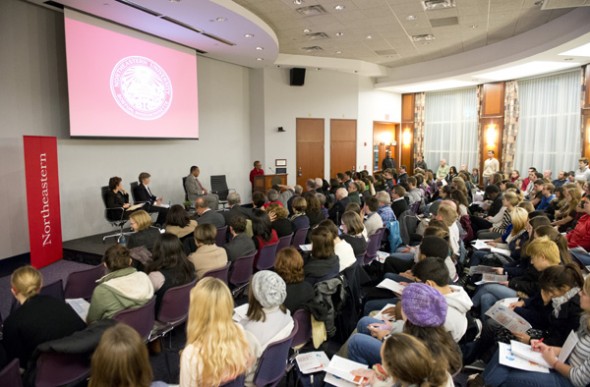
More than 200 students, faculty, and staff attended the sixth installment in a yearlong series on civic sustainability. Photo by Brooks Canaday.
By Elliot Horen, Computer and Information Science, University Scholar from Carlsbad, California
The timing could not have been better. Just five days before the ten-year anniversary of the landmark decision in Goodridge v. Department of Public Health legalizing gay marriage in Massachusetts, Northeastern brought two of the key participants in that case to speak about the future of the fight for gay and lesbian equality. I was struck by the juxtapositions that the panel presented. Mary Bonauto, who had argued so persuasively for the plaintiffs in that 2003 case, sat just feet away from Massachusetts Supreme Court Chief Justice Roderick Ireland, who had joined his colleagues behind the bench in that historic majority opinion. This was a reunion that I felt honored to witness and an inspiring reminder of the power of the legal system to create progress for marginalized groups.
Seated next to Ms. Bonauto was Professor Walters, the Director of the Women’s, Gender and Sexuality Studies Program at Northeastern.After joking that she played the roll of the “drunk uncle you wouldn’t want to invite to your wedding”, she delivered a progressive critique of gay marriage. She argued that marriage was a less than worthy goal and that media representations of the fight for gay marriage excluded those that wished to have no part in the institution. Here were two distinguished women who appeared to be diametrically opposed--one who had spent her life arguing for legal recognition of marriage in the courts and another who had authored books suggesting that that fight wasn’t worthwhile—but shared ground emerged. Professor Walters conceded that gay marriage was a “civil rights no brainer” and Ms. Bonauto agreed that the media should do more to depict the different desires those in the gay rights movement. The juxtaposition of the two perfectly illustrated the diversity of people and opinions in the LGBT community.
It is this community that I have grown up alongside. Having several close gay and lesbian family members, I have long been involved in the fight for marriage equality. The panel discussion gave me a new appreciation for how far the nation has come in the years since Goodridge—and indeed since 2008 when my home state voted by the narrowest of margins to forbid gay marriage. I was crushed by that bittersweet election—devastated that the promise of equality that had been meaningfully realized by the nation hadn’t made it to California. I remembered that feeling as I watched the panel. But listening to the speakers gave me hope.
Without progressive academics like Professor Walters, there would be a lack of diverse perspectives in the struggle for gay rights. Without tireless legal advocates like Mary Bonauto, there would be little legal urgency in the fight for equality. Without open-minded judges like Chief Justice Ireland, there would be minimal legal precedent allowing gays and lesbians the rights that millions take for granted. The fight for gay rights in this country is far from over. But this panel reminded me that as long as there are individuals willing to speak passionately and act decisively in defense of the rights of gay and lesbian people, the dream of equality can and will be achieved.
